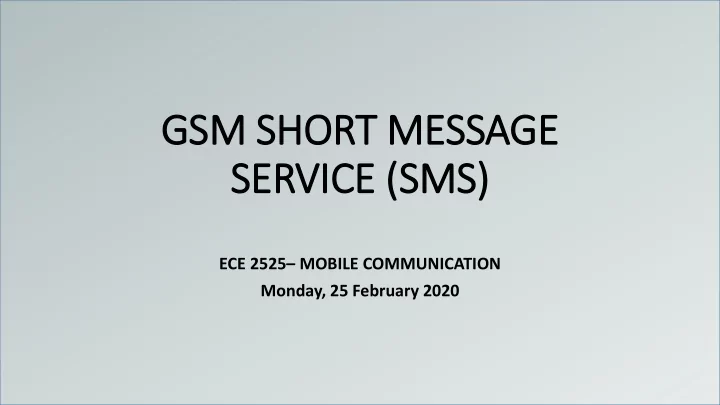

GSM SHORT MESSAGE SERVICE (SMS) ECE 2525 – MOBILE COMMUNICATION Monday, 25 February 2020
SAFARICOM 6-MONTH REVENUE SEPTEMBER 2018 GENERAL OBSERVATIONS OTHERS 1. Voice revenue, although SMS 2% 8% declining, is still dominant. 2. Value added services lead INTERNET DATA by Mobile money have VOICE 17% eclipsed data from the 42% second position. 3. SMS, although facing strong competition from mobile chat applications such as Whatsup, is still holding a respectable place at 8%. MPESA 31%
SMS DEFINITION 1. Short message service (SMS) is a globally accepted wireless service that enables the transmission of alphanumeric messages between mobile subscribers and external systems such as electronic mail, paging, and voice-mail systems. 2. Short Message Service (SMS) is a text messaging service component of phone, web, or mobile communication systems. It uses standardized Communications protocols to allow fixed line or mobile phone devices to exchange short text messages. 3. SMS provides a connectionless transfer of messages at low capacity and low-time performance. 4. SMS Messages must be no longer than 160 alpha-numeric characters and contain no images or graphics. 5. Messages longer than 160 characters are broken into shorter streams of less or equal to 160 characters. 6. The first SMS was sent in 1992 on a Vodafone GSM network in the UK
ADVANTAGES OF SMS Advantages of SMS are as follows. 1. SMS is the oldest most reliable means to communicate with mobile users 2. It enjoys widespread use 3. Useful for sending and receive emergency messages 4. SMS forms an integral part of other value-added service such as mobile money applications.
BASIC SMS OPERATION (1) 1. Mobile Station (MS) sends message to a Short Message Service Centre (SMSC). 2. SMSC sends a Request to the home location register (HLR) to find home data of the roaming customer. 3. HLR responds to the SMSC with the subscriber's status, e.g inactive, active and or where the subscriber is roaming. 4. If MS status from the HLR is "inactive", then the SMSC will hold onto the message for a period of time. 5. When the “Inactive” MS becomes “Active”, the HLR will sends SMS Notification to the SMSC, and the SMSC will attempt delivery. 6. If “Active”, the SMSC transfers the data the to the serving system. 7. The serving system pages the device, and if it responds, the message gets delivered. 8. The SMSC receives verification that the message was received by the end user, then categorizes the message as "sent" and will not attempt to send again.
BASIC SMS OPERATION (2) MSC/VLR 2 MS 2 MS 1 SMSC 1 MSC/HLR 1 SMSC 2 1. Submit SM 2. Send routing/status Infor 3. Forward Short Message 4. Request Infor on MS 2 6. Page MS 2 7. Authentication 8. MS2 Infor 9. Message Transfer/ACK 10. Delivery Report 11. Status Report
TYPES OF SMS There are three types of SMS, i.e 1. User-Specific: Displayed to the user. 2. ME-Specific: Processed by the Mobile Equipment instead of showing to the user. Examples include displaying a ringing tone, business card or modifying a default icon. 3. SIM-Specific: Processed by the SIM card using special software installed in the EEPROM of the SIM card.
BENEFITS OF SMS SMS benefits include the following: 1. Prompt Delivery of notifications and alerts/Fast data transfer 2. Guaranteed message delivery/Robust connectivity 3. Reliable, low-cost communication mechanism information 4. Ability to screen messages and return calls in a selective way/Security support
SMS-SC ACCESS PROTOCOLS • SMS protocols have evolved since the first commercial text message was sent in 1992. • Today the 3rd Generation Partnership Project (3GPP) maintains the SMS standard. • The binary access protocols used to access the SMS Service over TCP/IP or X.25 are; • SMPP, • CIMD, • UCP/EMI
Recommend
More recommend